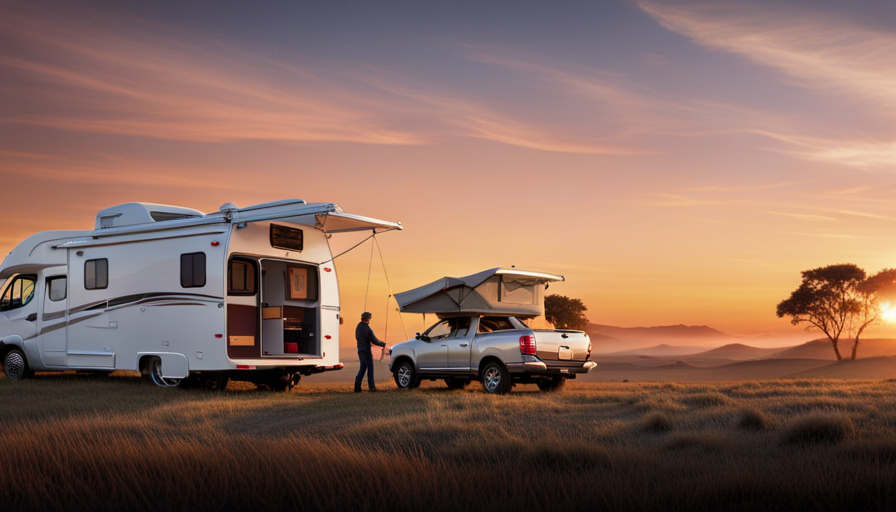Ever been in a situation where you need to transport a camper but don’t have a truck at your disposal? This might seem like a challenging situation, but don’t worry! In this article, I’ll walk you through multiple ways and options to move your camper even without owning a truck.
Whether your camper is small and lightweight or large and heavy, there are solutions for every situation. From renting a vehicle with towing capacity to utilizing a trailer dolly or mover, there are plenty of alternatives to consider. If you prefer to leave the heavy lifting to the professionals, hiring a towing service may be the best option for you.
Additionally, you could explore borrowing a friend’s truck or SUV, investing in a camper van or motorhome, and even using a tow bar or towed vehicle. If all else fails, there’s always the option of renting a U-Haul or similar moving truck, or even using public transportation or a shipping service.
So, let’s dive in and explore the exciting world of moving campers without a truck!
Key Takeaways
- Renting a vehicle with towing capacity provides convenience and a variety of options for moving a camper.
- Utilizing a trailer dolly or mover offers versatility and ease of maneuverability when moving a camper.
- Hiring a professional towing service ensures insurance coverage, peace of mind, and expertise in transporting campers.
- Utilizing a friend’s truck or SUV can be a cost-effective option for camper transportation, but it is important to check towing capacity and plan the route carefully.
Assess the Weight and Size of Your Camper
Now, you’ll want to assess the weight and size of your camper before you start thinking about how to move it without a truck.
Assessing weight distribution and determining the proper hitch size are crucial steps in ensuring a safe and successful move.
First, you need to determine the weight of your camper. This can be done by consulting the manufacturer’s specifications or using a specialized scale designed for weighing trailers. It’s important to know the weight of your camper to ensure that the vehicle you choose for towing can handle the load.
Next, consider the weight distribution of your camper. The weight should be evenly distributed to prevent any potential sway or instability during transportation. Make sure to check the weight distribution by measuring the tongue weight, which is the weight that presses down on the hitch. This will help you determine the appropriate hitch size for your camper.
With the weight and distribution assessed, you can now consider renting a vehicle with towing capacity. This will ensure that you have the necessary power and stability to safely move your camper without a truck. Keep in mind that renting a vehicle with the appropriate towing capacity is essential for a smooth and trouble-free journey.
Consider Renting a Vehicle with Towing Capacity
Consider renting a vehicle with towing capacity so you can easily transport your camper. Did you know that over 50% of rental vehicles now offer towing capabilities? Renting a trailer is a convenient and cost-effective solution if you don’t own a vehicle with the necessary towing capacity.
Here are some reasons why renting a vehicle is a great option:
-
Convenience: Renting a vehicle with towing capacity allows you to transport your camper without the hassle of finding a friend who has a suitable vehicle. It gives you the freedom to move your camper whenever you want, without relying on others.
-
Variety: Rental companies offer a wide range of vehicles with different towing capacities. You can choose the one that best suits the weight and size of your camper, ensuring a safe and efficient transport.
-
Expertise: Rental companies have experienced staff who can guide you in choosing the right vehicle for your camper. They can provide you with valuable advice and ensure that you have all the necessary equipment for a successful move.
-
Cost-effective: Renting a vehicle can be a more affordable option compared to buying a new vehicle or borrowing a friend’s vehicle every time you need to move your camper.
Now, let’s explore another method to move your camper without a truck: using a trailer dolly or mover.
Use a Trailer Dolly or Mover
Using a trailer dolly or mover can effortlessly transport your camper, giving you the freedom to effortlessly explore new destinations. Trailer dollies are compact devices that attach to the front of the camper, allowing you to easily maneuver it without the need for a truck.
One of the main benefits of using a trailer dolly is its versatility. It can be used with various types of campers, from small travel trailers to larger fifth wheels. Additionally, trailer dollies have a high weight capacity, making them suitable for moving heavy campers.
When choosing a trailer mover, there are a few factors to consider. First, make sure to select a dolly or mover that is compatible with your camper’s weight and hitch type. It’s also important to choose a model that has sturdy construction and durable wheels to ensure stability and ease of use. Some trailer dollies come with additional features like electric motors or brakes, which can provide even more convenience and control.
Using a trailer dolly or mover is a practical solution for moving your camper without a truck. By considering the benefits of a trailer dolly and choosing the right one for your needs, you can effortlessly transport your camper to your desired destination. However, if you prefer to leave the towing to the professionals, you can always hire a professional towing service.
Hire a Professional Towing Service
If you’re in a bind and need expert assistance, why not let the professionals take care of towing your trailer for you? Hiring a professional towing service can be a convenient option when you don’t have a truck to move your camper. Here are the pros and cons of hiring a professional towing service:
- Convenience: A professional towing service will handle all the logistics of moving your camper, saving you time and effort.
- Expertise: Towing professionals have the necessary experience and equipment to safely transport your camper to its destination.
- Insurance: Reputable towing services typically provide insurance coverage for any damages that may occur during the towing process.
- Peace of mind: Knowing that your camper is being handled by professionals can give you peace of mind, especially if you’re not experienced in towing.
To find a reliable towing service near you, consider the following steps:
-
Research: Look for towing services in your area and read reviews or ask for recommendations from friends or fellow campers.
-
Check credentials: Ensure that the towing service is licensed, insured, and has a good reputation.
-
Get quotes: Contact multiple towing services to compare prices and services offered.
-
Verify availability: Confirm that the towing service can accommodate your schedule and timeline.
By hiring a professional towing service, you can ensure that your camper is moved safely and efficiently. In the next section, we’ll discuss another option: utilizing a friend’s truck or SUV.
Utilize a Friend’s Truck or SUV
Utilize a friend’s truck or SUV to effortlessly transport your trailer. When it comes to moving a camper without a truck, using a friend’s vehicle can be a convenient and cost-effective solution.
First, make sure your friend’s truck or SUV has the towing capacity required to handle the weight of your camper. It’s important to check the vehicle’s towing specifications and ensure that it meets the necessary requirements.
Once you’ve confirmed that your friend’s vehicle is suitable for towing, you can proceed with the necessary preparations. Attach a trailer hitch to the back of the truck or SUV, making sure it’s securely fastened. Connect the trailer’s wiring harness to the vehicle’s electrical system, allowing for proper functioning of the trailer lights and brakes.
Before hitting the road, it’s crucial to have a clear understanding of the route you’ll be taking. Plan your journey in advance, considering any potential obstacles or road restrictions that may affect towing a camper.
In some cases, if your friend’s truck or SUV is not available or suitable for towing, you can explore the option of renting a vehicle specifically designed for towing. This can provide you with the necessary power and capabilities to move your camper safely and efficiently.
With your friend’s truck or SUV, or a rental vehicle, you’ll be ready to transport your trailer with ease. Now, let’s delve into the next section and explore camper delivery services.
Explore Camper Delivery Services
Now that we’ve explored the option of utilizing a friend’s truck or SUV to move a camper, let’s dive into another solution: exploring camper delivery services.
When it comes to moving a camper without a truck, these services can be a lifesaver. Camper delivery services offer a range of transportation options for your camper. They have specialized trailers and equipment designed to securely transport campers of various sizes. Whether you have a small teardrop camper or a large fifth-wheel, these services can handle the job.
One of the major advantages of using camper delivery services is convenience. They take care of all the logistics and transportation, allowing you to focus on other aspects of your move. Additionally, these services are often insured, providing you with peace of mind knowing that your camper is protected during transit.
Another advantage is that camper delivery services can transport your camper long distances, including across state or even national borders. This can be especially beneficial if you’re moving to a new location far away and don’t have the means to transport your camper yourself.
With the convenience, security, and long-distance capabilities offered by camper delivery services, they can be an excellent option for moving your camper. However, if you’re looking for a more permanent solution, you may want to consider investing in a camper van or motorhome. This will provide you with the freedom and flexibility to travel and camp whenever you desire.
Invest in a Camper Van or Motorhome
Consider purchasing a camper van or motorhome to gain the ultimate freedom and flexibility for your camping adventures. With a camper van, you can travel wherever you want, whenever you want, without the need for a truck.
Here are some benefits of owning a camper van:
-
Versatility: A camper van allows you to have both a transportation vehicle and a living space in one. You can easily switch between driving and camping modes, making it ideal for road trips.
-
Comfort: Camper vans are equipped with all the amenities you need, including a bed, kitchenette, bathroom, and storage space. This ensures a comfortable and convenient camping experience.
-
Cost-effective: While the initial investment may be higher than a tent or trailer, owning a camper van can save you money in the long run. You don’t have to worry about paying for hotels or eating out, as you have everything you need in your van.
-
Independence: With a camper van, you have the freedom to explore remote locations and stay off-grid. You can camp in national parks, beaches, or even in the middle of nowhere, enjoying nature at its best.
-
Resale value: Camper vans often retain their value well, so if you decide to sell it in the future, you may be able to recoup a significant portion of your investment.
Now, let’s explore another option for moving a camper without a truck – using a tow bar or towed vehicle.
Use a Tow Bar or Towed Vehicle
One alternative for transporting your camper van is by utilizing a tow bar or a towed vehicle, providing you with a convenient and flexible towing solution. When it comes to tow bar alternatives, there are a few options to consider. One popular choice is a tow dolly, which allows you to tow your camper van with a regular car. Another option is a flatbed trailer, which provides a stable and secure platform for transporting your camper van.
To help you decide which option is best for you, here is a table comparing tow bar alternatives:
| Tow Bar Alternative | Pros | Cons |
|---|---|---|
| Tow Dolly | – Can be towed with a regular car – Affordable option |
– Extra equipment to store – Limited maneuverability |
| Flatbed Trailer | – Stable and secure platform – Can tow larger camper vans |
– Requires a larger towing vehicle – Higher cost |
When using a tow bar or a towed vehicle, safety considerations are of utmost importance. Ensure that the towed vehicle is properly connected to the tow bar and that all safety chains and straps are secure. Additionally, check the weight capacity of your towing vehicle and make sure it is compatible with the weight of your camper van.
Consider renting a U-Haul or similar moving truck for a more straightforward and hassle-free method of moving your camper van.
Consider Renting a U-Haul or Similar Moving Truck
If you’re looking for a simpler and stress-free way to transport your camper van, why not try renting a U-Haul or a similar moving truck? Renting a U-Haul or similar moving truck has its pros and cons when it comes to moving a camper.
One of the main advantages is that it provides you with a reliable and spacious vehicle that is specifically designed for moving purposes. These trucks often come equipped with features such as ramps and tie-downs, making it easier to load and secure your camper. Additionally, renting a moving truck allows you to have more control over the transportation process, as you can choose the route and schedule that works best for you.
However, there are a few cons to consider as well. Renting a moving truck can be costly, especially if you’re only using it for a short distance or a one-time move. Additionally, driving a larger vehicle like a moving truck may require some adjustment if you’re not used to it. It’s important to familiarize yourself with the dimensions and handling of the truck before hitting the road.
To properly secure your camper on a rental moving truck, there are a few key steps to follow. Start by ensuring that the camper is clean and empty of any loose items that could shift during transportation. Next, use heavy-duty straps or chains to secure the camper to the truck, making sure to tighten them securely. It’s also a good idea to use additional support, such as wheel chocks or blocks, to prevent any movement during transit.
Renting a U-Haul or similar moving truck can be a convenient option for transporting your camper. However, it’s important to weigh the pros and cons and take the necessary precautions to properly secure your camper on the truck. If you’re not comfortable with driving a larger vehicle or if the distance is too far, you may want to consider alternative options such as using public transportation or a shipping service to move your camper.
Use Public Transportation or a Shipping Service
Utilizing public transportation or a shipping service offers an alternative method to effortlessly transport your camper van, allowing you to sit back, relax, and enjoy the journey without the need for a rental truck.
When it comes to public transportation for camper transport, there are a few options available. One option is to use a train or a bus that allows for the transportation of oversized vehicles. Some train companies offer specific services for camper vans, where you can simply drive your camper onto a designated train car and then ride along with it to your destination.
Another option is to use a shipping service specifically designed for moving campers. These services are equipped with the necessary tools and expertise to safely transport your camper van. They will secure your camper onto a trailer or container and handle all the logistics involved in moving it from one location to another.
It is important to research and compare different shipping services to ensure you choose the one that best suits your needs in terms of cost, reliability, and customer reviews.
Whether you opt for public transportation or a shipping service, these alternatives provide a convenient and efficient way to move your camper van without the need for a truck.
Frequently Asked Questions
Can I use a regular car to tow a camper?
Yes, you can use a regular car to tow a camper, but there are some limitations. Regular cars have lower towing capacities compared to trucks, so you need to check the car’s towing capacity and ensure it’s sufficient for the weight of the camper.
Additionally, you may need to install a hitch and make sure the car has the necessary towing equipment. If your car’s capacity is insufficient, alternative methods such as renting a truck or hiring a professional transport service can be considered.
Is it safe to move a camper without professional assistance?
Safety precautions and necessary equipment are crucial when moving a camper without professional assistance. Before attempting to move a camper, it’s important to ensure that the vehicle used for towing is capable of handling the weight and has the necessary towing capacity. Additionally, proper hitching techniques, such as using a weight distribution system, and regular maintenance of both the towing vehicle and the camper are essential for a safe and successful journey.
How do I determine the towing capacity of a rental vehicle?
To determine the towing capacity of a rental vehicle, there are several factors you need to consider. First, check the vehicle’s owner’s manual or contact the rental company for towing specifications. The vehicle’s weight, engine power, transmission, and suspension all play a crucial role in determining its towing capacity. It’s important to understand that the towing capacity may vary depending on these factors. So, make sure you carefully evaluate these specifications before attempting to tow a camper with a rental vehicle.
Are there any legal requirements or permits needed to move a camper without a truck?
When moving a camper without a truck, there are important legal considerations to keep in mind. Depending on the weight and size of the camper, you may need a special permit to transport it.
Additionally, insurance coverage is crucial to protect yourself and the camper during the move. It’s recommended to check with your local transportation department for specific requirements and to contact your insurance provider to ensure adequate coverage for the journey.
Can I use a scooter or motorcycle to tow a camper?
Using a scooter or motorcycle to tow a camper is like trying to pull a boulder with a rubber band. Scooters have limited towing capabilities, and most aren’t designed for heavy loads like campers. Similarly, motorcycles have towing capacities that vary depending on the model and manufacturer. It’s crucial to check the specific scooter towing limitations and motorcycle towing capacity before attempting to tow a camper.
Conclusion
In conclusion, moving a camper without a truck may seem like a daunting task, but it’s definitely possible with the right resources and planning.
By assessing the weight and size of your camper, considering renting a vehicle with towing capacity, using a trailer dolly or mover, hiring a professional towing service, utilizing a friend’s truck or SUV, investing in a camper van or motorhome, using a tow bar or towed vehicle, considering renting a U-Haul or similar moving truck, or using public transportation or a shipping service, you can successfully transport your camper to your desired location.
One interesting statistic to note is that according to a study conducted by the American Camper Association, 60% of campers were able to move their camper without a truck by utilizing alternative methods such as renting a vehicle with towing capacity or using a professional towing service. This statistic highlights the fact that there are various options available for moving a camper without a truck, and it’s a common occurrence among campers.










